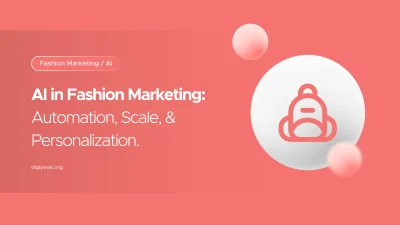
AI in Fashion Marketing: Automation, Personalization, Scale
In an industry that moves at the speed of culture, staying still means falling behind. …
26/05/2023 -
9 dk okuma
Stay up to date with Peakers
AI and Machine Learning have brought about a profound revolution in the business landscape, and this transformation is set to continue for many years. Whether it’s in the domains of marketing, operations, or sales, integrating AI into business environments offers several advantages.
These include reducing the time spent on repetitive tasks, boosting employee productivity, and elevating the overall customer experience. Moreover, AI implementation plays a crucial role in error prevention and early crisis detection.
In addition, AI is reshaping the field of digital marketing by introducing innovative channels and approaches for engaging with target audiences. The mixture of AI and digital marketing has emerged as one of the most successful methods for achieving remarkable outcomes in terms of lead generation for marketing strategies.
By leveraging AI (Artificial Intelligence), brands and businesses can explore new avenues to captivate their target audience and achieve exceptional marketing results. In this article, we will explore several ways of using AI in different sectors. But before diving in, we will share our takeaways from reliable sources.
If you are ready, let’s start!
After reviewing the reliable sources below, we have drawn some very important and useful conclusions. Here are the comprehensive findings and important takeaways:
Wharton School, University of Pennsylvania:
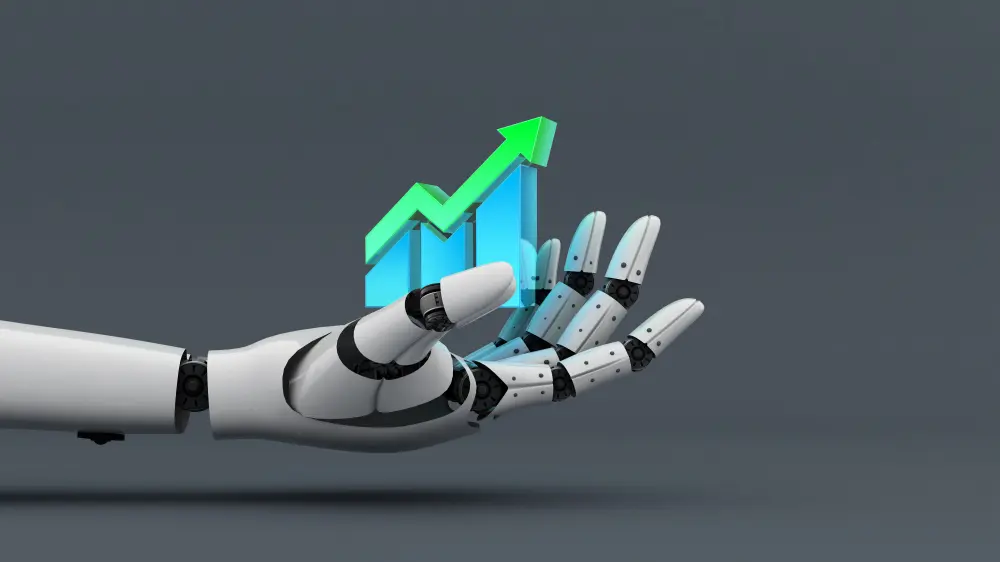
The integration of AI in sales and marketing opens up a world of possibilities for businesses. From personalized customer experiences and predictive analytics to intelligent lead generation and campaign optimization, AI empowers organizations to achieve remarkable results. By harnessing the power of AI, businesses can unlock new levels of efficiency, productivity, and customer satisfaction, gaining a competitive edge in today’s dynamic marketplace. Embracing AI in sales and marketing is no longer a luxury; it has become a necessity for businesses striving for long-term success in the digital age.
According to research conducted by the Harvard Business Review, organizations that employ AI technology in their sales processes can witness a remarkable surge of over 50% in lead generation. Moreover, they can experience a substantial reduction of 60-70% in call duration, resulting in more efficient communication. Additionally, these companies can achieve cost savings ranging from 40% to 60% by leveraging AI capabilities.
Artificial Intelligence (AI) and Machine Learning (ML) can incredibly go along with your sales and marketing team with the following aspects;
The integration of AI in Customer Relationship Management (CRM) marks a significant shift in how businesses engage with their customers. By harnessing AI’s capabilities for intelligent customer insights, predictive analytics, automated support, intelligent sales assistance, and hyper-personalized marketing campaigns, businesses can elevate their CRM strategies to new heights.
The result is enhanced customer satisfaction, improved loyalty, and sustainable business growth. Embracing AI in CRM is no longer a choice; it is a necessity for businesses aiming to stay competitive in today’s data-driven and customer-centric landscape.
According to a study (2022 CRM Impact Report), the most adopted use cases for artificial intelligence and machine learning for CRM are;
Artificial Intelligence (AI) is reshaping the healthcare landscape, empowering healthcare providers with enhanced diagnostic capabilities, personalized treatment approaches, streamlined operations, and improved patient outcomes.
With AI in healthcare’s potential to increase diagnostic accuracy, facilitate precision medicine, optimize healthcare operations, enable remote patient monitoring, and accelerate research, it holds tremendous promise for the future of healthcare. As AI and ML (Machine Learning) continue to evolve, they will play an increasingly integral role in transforming healthcare delivery, making it more accessible, efficient, and patient-centric.
By leveraging AI technologies, healthcare providers can reveal vast amounts of data, gain valuable insights, and enhance decision-making processes.
You can find couple of useful subjects below;
Take Advantage of Automation with Artificial Intelligence!
How can you use your time more efficiently? Artificial intelligence saves you time by automating repetitive tasks. Learn how you can leverage AI to accelerate your business processes.
The human resource landscape has undergone significant changes since the onset of the COVID-19 pandemic. With the increasing prevalence of hybrid and remote work models, HR teams find themselves operating in a notably transformed environment.
Virtual recruitment has gained traction, and there is now a heightened focus on fostering diversity and inclusion within organizations, both of which have introduced fresh dynamics while reinforcing existing ones. To remain competitive in this evolving landscape, the adoption of new platforms and technologies has become necessary.
Artificial Intelligence (AI) plays a pivotal role in driving this growth, as it serves as a central component in leveraging the advantages of these advancements. It is also enabling HR professionals to optimize talent acquisition, enhance employee engagement and retention, transform learning and development, streamline performance management, and make data-driven decisions.
As organizations embrace AI in HR, they can create more efficient, engaging, and inclusive workplaces, driving workforce productivity and overall business success. With AI’s continued advancements, the future of HR promises even greater innovations, as organizations leverage technology to unlock the full potential of their human capital.
According to Business News Daily, AI can transform HR with following ways;
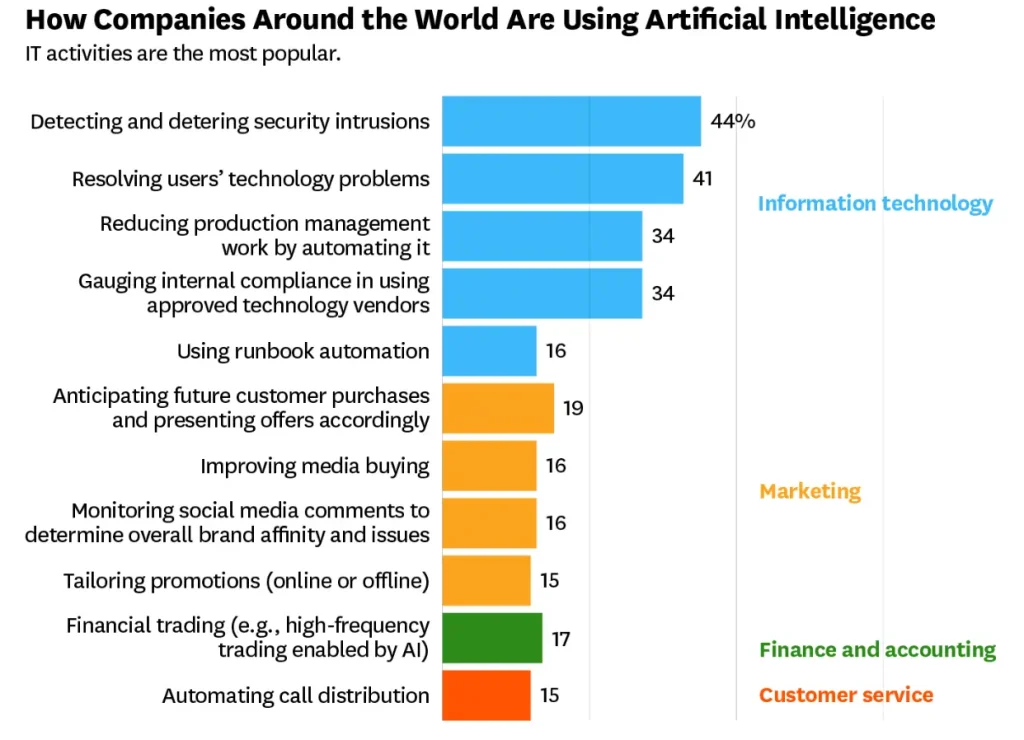
Findings from Microsoft’s Economic Guardians of the Future report indicate that finance teams are undergoing a transformative phase, where they must find a delicate equilibrium between driving strategic innovation and safeguarding their company’s long-term stability.
A striking 80% of finance leaders perceive a heightened level of challenge as they and their teams are increasingly expected to contribute value beyond their traditional roles and responsibilities. This shift can be attributed, at least in part, to the volatile economic landscape characterized by factors like inflation, recession, and international conflicts.
Artificial Intelligence (AI) is also transforming the accounting and finance domain, empowering professionals with automation, advanced analytics, fraud detection, and compliance capabilities. By leveraging AI in accounting and finance, organizations can streamline financial operations, improve decision-making processes, and mitigate risks.
As AI continues to evolve, the future of accounting and finance promises even greater efficiencies, increased accuracy, and enhanced strategic insights. Embracing AI in accounting and finance is crucial for organizations aiming to stay competitive in the rapidly evolving financial landscape.
Here are 5 ways to leverage AI in finance and accounting;
Artificial Intelligence (AI) is remodeling the landscape of SEO and Content Marketing, empowering marketers to optimize their strategies, create engaging content, deliver personalized experiences, and track performance effectively. Businesses can enhance their organic visibility, attract relevant traffic, and drive meaningful user engagement.
As AI continues to advance, the future of SEO and content marketing promises even greater precision, personalization, and effectiveness. Embracing AI in SEO and content marketing is vital for businesses aiming to stay competitive in the ever-evolving digital landscape.
Below, you can find various ways to enhance your SEO and Content Marketing departments’ efforts;
Artificial Intelligence (AI) has been transforming the digital marketing landscape for several years. With the increasing volume of data and the growing complexity of digital marketing strategies, AI has become an indispensable tool for marketers. AI-powered tools are being used in various aspects of digital marketing, including targeting, content creation, personalization, customer engagement, and more.
One of the most significant advantages of AI in digital marketing is the ability to analyze large amounts of data and identify patterns and trends that would be difficult for humans to discern. This data analysis can help marketers optimize their campaigns, understand customer behavior, and make more informed decisions.
AI is also being used to personalize the customer experience. By analyzing customer data, AI-powered tools can deliver personalized content and product recommendations to individual customers, improving the likelihood of conversion and customer loyalty. Additionally, AI can help automate routine tasks, freeing up marketers’ time to focus on more strategic initiatives.
Digipeak, as an AI development company, can play a crucial role in shaping the future of AI and helping individuals and businesses navigate this rapidly changing landscape.
The AI-supported digital marketing services such as analytics & data, social media management, and creative design that Digipeak delivers to its customers help firms contact their target audiences more efficiently and acquire a competitive advantage in the digital realm.
Digipeak’s creative team’s integration of artificial intelligence technology with digital marketing services is intended to give an even more effective solution to its customers. If you want to know how our AI-powered solutions may help you plan for the future with growth marketing methods, contact Digipeak.
Get an Offer


Join Us So You Don't
Miss Out on Digital Marketing News!
Join the Digipeak Newsletter.
Related Posts

In an industry that moves at the speed of culture, staying still means falling behind. …
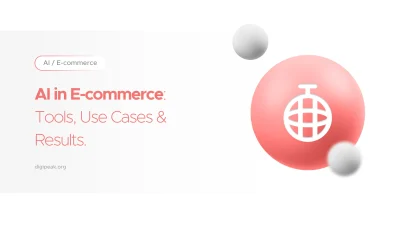
Do you recall when "Artificial Intelligence" in e-commerce was little more than a basic chatbot? …
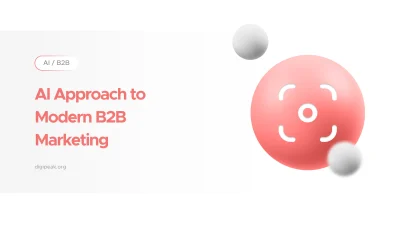
The year is 2026. The digital marketing playbook from just a couple of years ago …
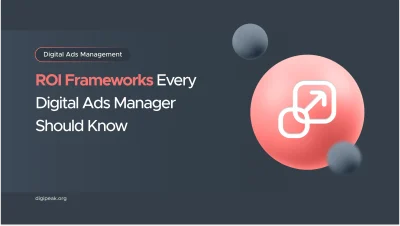
Before we explore the new frameworks, let's face the reality of our current environment. The …